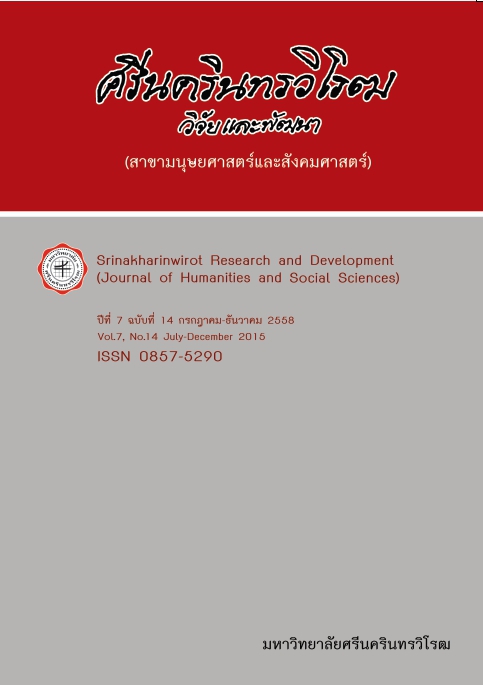การพัฒนาตัวบ่งชี้คุณลักษณะผู้นำตามแนวคิดคติรวมหมู่ของผู้นำชุมชนที่ปฏิบัติงานในเครือข่ายภาคประชาชนในการป้องกันและแก้ไขปัญหายาเสพติดพื้นที่กรุงเทพมหานคร THE DEVELOPMENT OF COLLECTIVE LEADERSHIP INDICATORS IN COMMUNITY LEADERS WORKING WITH PEOPLE NETWORKS FO
Keywords:
ภาวะผู้นำ แนวคิดคติรวมหมู่ การวิเคราะห์องค์ประกอบเชิงยืนยัน ตัวบ่งชี้ผู้นำAbstract
บทคัดย่อ
การวิจัยครั้งนี้มีจุดมุ่งหมายเพื่อพัฒนาตัวบ่งชี้และตรวจสอบความตรงเชิงโครงสร้างของโมเดลคุณลักษณะผู้นำตามแนวคิดคติรวมหมู่ ผู้เข้าร่วมในการวิจัยคือผู้นำชุมชนในเขตกรุงเทพมหานครที่ปฏิบัติงานในเครือข่าย
ภาคประชาชนในการป้องกันและแก้ไขปัญหายาเสพติดพื้นที่กรุงเทพมหานคร โดยมีขนาดตัวอย่างจำนวน 506 คนได้มาจากการสุ่มแบบ 2 ขั้นตอน เครื่องมือที่ใช้ในการวิจัยประกอบด้วยแบบสอบถามข้อมูลทั่วไป และมาตรวัดความเป็นผู้นำตามแนวคิดคติรวมหมู่ที่ผู้วิจัยพัฒนาขึ้น โดยอิงตามการศึกษาของ Hiller, Day และ Vance (2006)
และการลงพื้นที่เก็บข้อมูล วิเคราะห์ข้อมูลด้วยการวิเคราะห์โมเดลองค์ประกอบเชิงยืนยันอันดับสอง
ผลการศึกษาพบว่าโมเดลการวิเคราะห์องค์ประกอบเชิงยืนยันอันดับสองของคุณลักษณะความเป็นผู้นำตามแนวคิดคติรวมหมู่มีความสอดคล้องกลมกลืนกับข้อมูลเชิงประจักษ์ โดยตัวบ่งชี้ความเป็นผู้นำตามแนวคิดคติรวมหมู่ ประกอบด้วยตัวบ่งชี้หลัก 4 ตัวบ่งชี้ ได้แก่ ตัวบ่งชี้หลักด้านการวางแผน ตัวบ่งชี้หลักด้านการแก้ปัญหา ตัวบ่งชี้หลักด้านการให้การสนับสนุน และตัวบ่งชี้หลักด้านการสอนงานแก่สมาชิกใหม่ โดยมีตัวบ่งชี้ย่อยรวมจำนวน 22 ตัวบ่งชี้
Abstract
The purposes of this research were to develop and validate the indicators of collective leadership in community leaders working with People Networks for Drugs Prevention and Drugs Problem Solving in Bangkok Metropolis. The participants were 506 community leaders in Bangkok area collected through the two stage random sampling techniques. Data were collected by questionnaires and collective leadership scale with high reliability. The research process followed the development of indicators of collective leadership initiated by Hiller, Day, & Vance (2006) and area data collecting. The second order factor analysis was used for analyzing the data.
The results found 4 principle indicators of collective leadership which are planning indicators, problem solving indicators, supporting indicators and mentoring indicators, which derived from 22 sub-principle indicators. Furthermore, the results indicated that the collective leadership measurement model of community leaders in Bangkok area was fitted to the empirical data.
Downloads
Downloads
Published
How to Cite
Issue
Section
License
Srinakharinwirot Research and Development Journal of Humanities and Social Sciences is licensed Under a Creative Commons Attribution-NonCommercial-NoDerivs 4.0 International (CC-BY-NC-ND 4.0) License, Unless Otherwise Stated. Please Read Journal Policies Page for More Information on Open Access, Copyright and Permissions.



